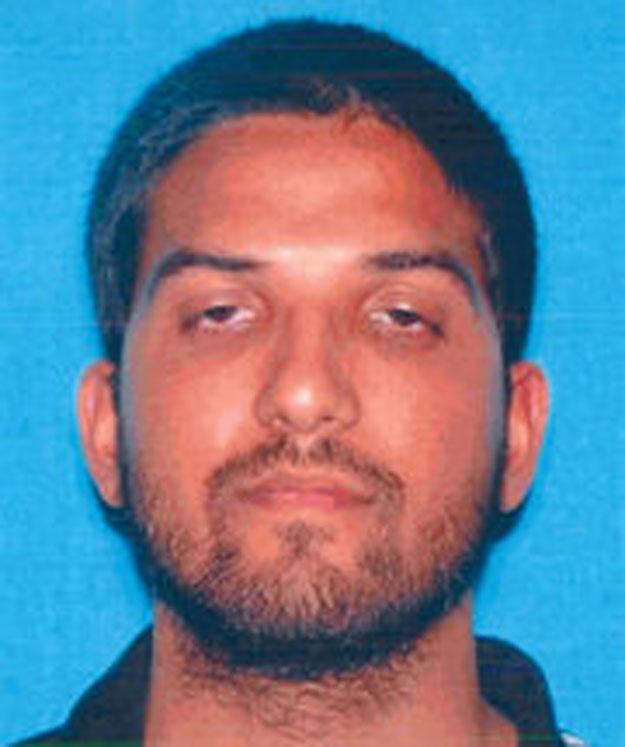
But for all the outward signs of suburban normality, this couple, according to the police, used their comfortable home in a middle-class community near here to stockpile weapons and build pipe bombs. And on Wednesday morning, they left their 6-month-old daughter with her grandmother before heading to a holiday party with Farook’s co-workers where, the police say, they killed 14 people and wounded 21 others. A few hours later, they died in a crush of bullets in a brutal face-off with the police.
'Radicalised' California shooter had terror ties: reports
As investigators puzzle over their motives, the couple — the husband born in Illinois and raised in southern California, the wife born in Pakistan and recently residing in Saudi Arabia — have emerged as one of the most perplexing pairs in the recent history of mass homicide. Their lives, and motives, remain mysteries to investigators, who are looking at possible ties to international terrorism but have not ruled out the possibility that this was the bloody culmination of a workplace dispute.
Farook and Malik were highly devout Muslims, described by friends as quiet and unobtrusive. Farook, 28, who was a lanky six feet tall and had a full beard during long periods of his life, graduated from California State University, San Bernardino, with a degree in environmental engineering. He worked for the San Bernardino County health department, checking food surfaces at restaurants and bakeries and chlorine levels in public swimming pools.
San Bernardino shootings: Pakistani-origin couple behind California carnage
Far less is publicly known about Malik, 27, who lived with Farook and his mother in Redlands, about five miles from where the attack took place. Farook brought her to the United States in July 2014, with a Pakistani passport and a K-1 visa, which designated her his fiancée. He applied for a permanent resident green card for her in September 2014, and she was granted a conditional card last July after passing a background check.
In registering for one of two dating services he used, Farook said he spoke Urdu, though friends said the couple spoke to each other in English. Farook, in a posting on one of the dating services, said he was open to dating a woman of any faith but was looking for “someone who takes her religion very seriously and is always trying to improve her religion.”
Farook was well known in the religious Muslim community here. From 2012 to 2014, he showed up twice a day for services at the Islamic Center of Riverside, sometimes as early as 4:30 am, and again in the evenings, said Mustafa H Kuko, the director of the center. In a mosque where attendance on Fridays regularly tops 1,000, Farook stood out as one of the most devout members, wearing long robes to Friday services.
Female suspect of California shooting was Pakistani: CAIR
“He always kept a bit of a distance between him and other people,” Kuko said. “He never had any dispute with anyone here at all. Mostly when the service is over, his usual move is from the prayer to his car. If he saw the director on the way out, he would say “Salam,” but that was it; he would leave.
Farook grew up in Riverside; his parents were born in Pakistan. His father could be a violent and alcoholic father, capable of lashing out at his wife and children, according to statements his mother, Rafia Farook, made in a series of divorce proceedings beginning in 2006. The father, also named Syed Farook, called his wife names, screamed at his children, hurled home appliances and, at the worst moments, grew so combative that his children had to step between him and his wife, she asserted.
The elder Farook forced his family to move out of their home in 2006, Farook said in court papers, but he continued to harass her. “My husband is mentally ill and is on medication but is also an alcoholic and drinks with the medicine,” she said.
California shooting suspect was devout Muslim: father
During those years, the family seemed to struggle with financial troubles. Their home in Riverside, which the parents bought in 2000 before the title was transferred to Rafia Farook’s name, went into the early stages of foreclosure before Farook made an overdue mortgage payment in 2011.
A neighbor, Victor Venegas, said that the elder Farook had worked for him driving trucks until 2003 and would come around looking for money. “He would sometimes come over without calling,” Venegas said, and ask, “ ‘Can I have $10 to buy cigarettes?’ ”
Around Christmas one year, Venegas recalled, the father asked where he could buy a goat; he especially wanted a pregnant animal, saying that goat fetus was a delicacy. Venegas helped him get two. They ate one, and the family kept the other alive in the backyard, along with some chickens, where neighbors heard it bleating.
Leaders of mosques where California shooter prayed say rampage betrayed Islam
Korey Roseman, 28, a former neighbor, said he spent time with the younger Syed Farook growing up, but that as a rule, the boy was not permitted to stray far from the family home. “He was pretty cool at the time,” Roseman said. “He was soft-spoken, seemed intelligent. He was very nice. We used to play basketball in his front yard. The rest of his family was a little standoffish for whatever reason.”
Farook’s father frequently dressed in traditional Pakistani attire, with a white robe and a head wrap, even when he was driving the truck, and his mother usually kept her head covered, neighbors said. But the children dressed in Western clothes. Roseman said that Syed did not talk about his faith or pray openly at school. “He never mentioned his religion,” Roseman said.
As a teenager, Syed occasionally appeared in the same traditional dress as his father, neighbors said. By that time, he was often seen in the family’s driveway, working on cars. He kept to himself, Venegas said, but was always friendly when approached.
“He wasn’t very social; he was just out there doing his thing on the cars,” Venegas said.
California shooting suspect identified as Syed Farook: media
Farook signed up on two dating sites when he was in his early 20s, one aimed at Indian singles and the other at people in the United Arab Emirates. He described his family as “religious but modern.” He said he did not smoke or drink. He said of himself, “Enjoy working on vintage and modern cars, read religious books, enjoy eating out sometimes travel and just hang out in back yard.” He also wrote that he enjoyed “doing target practice with younger sister and friends.”
Farook enrolled in a graduate program in environmental engineering at California State University, Fullerton, in the fall of last year. But he continued to work for the county health department. His name appears on a county inspection report as recently as October 1 for Cuca’s Mexican Restaurant in Rialto, California.
Kuko, the director of the mosque Farook attended, said that before Farook went to Saudi Arabia to pick up his future wife, “he was asking my advice, my blessings,” he said. “He did double-check on her family background, and he was quite convinced that she was the right person for him.”
They held the religious ceremony in Saudi Arabia and a reception at the mosque in Riverside, once they returned.
At least 14 dead in shooting at California disabled center
Kuko said he was still trying to make sense of the idea that someone like Farook could have been involved in mass murder.
“He’s a mosque-goer,” Kuko said of Farook. “He comes to the mosque regularly. Something might have happened to him mentally, physically or whatever that made him change.”
He said, “I never thought of him as someone who is violent.”
(Additional reporting by Julie Turkewitz and Benjamin Mueller)
This article originally appeared on New York Times, a partner of The Express Tribune.















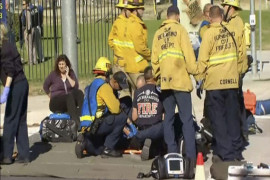


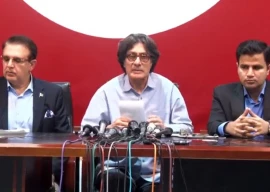
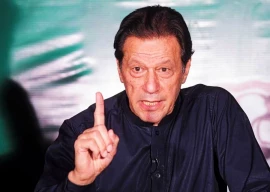
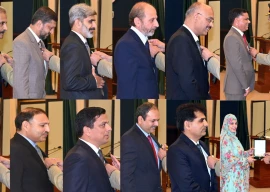














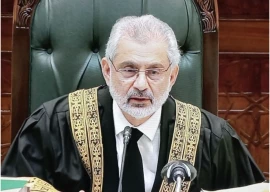







COMMENTS (32)
Comments are moderated and generally will be posted if they are on-topic and not abusive.
For more information, please see our Comments FAQ